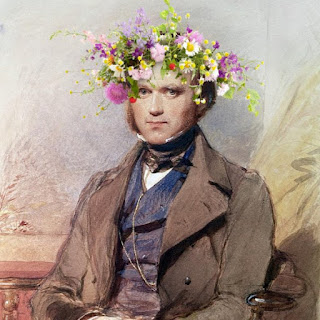God, Pain, and Charles Darwin
Some folks seem to have the notion that Charles Darwin applied science to his observations, leading to the publication of On the Origin of Species. That is not the case. He had ideas for which he wanted to find support. Interestingly, his writing was not intended as a way to kill God.
People have debated whether or not Darwin was an atheist throughout his life, and his writing may imply that he was unsure himself. Reading Origin one can see an unevenness, and maybe a vague defense of the Creator regarding pain.
 |
| I gave Charlie a floral wreath at PhotoFunia. |
The common perception of the effect of Charles Darwin’s Origin of Species on the Victorian public has been that 19th-century readers felt their previously held convictions about a providential cosmos to have been rudely threatened by Darwin’s materialist ideas. The locus classicus for that interpretation was a famous 1888 bestseller on the subject of a clergyman’s loss of faith, Robert Elsmere, by Mrs. Humphry Ward (née Mary Arnold). Ever since the publication of Ward’s novel, much has been written on the subject of how the theodicean certainties of the many were disturbed by the promulgation of Darwinian theory.
The article featured here is written by a professing agnostic writing for an Intelligent Design site run by the Discovery Institute. I see some similarities between the author's spiritual position and that of Darwin. Please pray for the author, Neil Thomas, that he will admit to the truth and come to Christ. The rest of the article is found at "Darwin and the Problem of Pain."